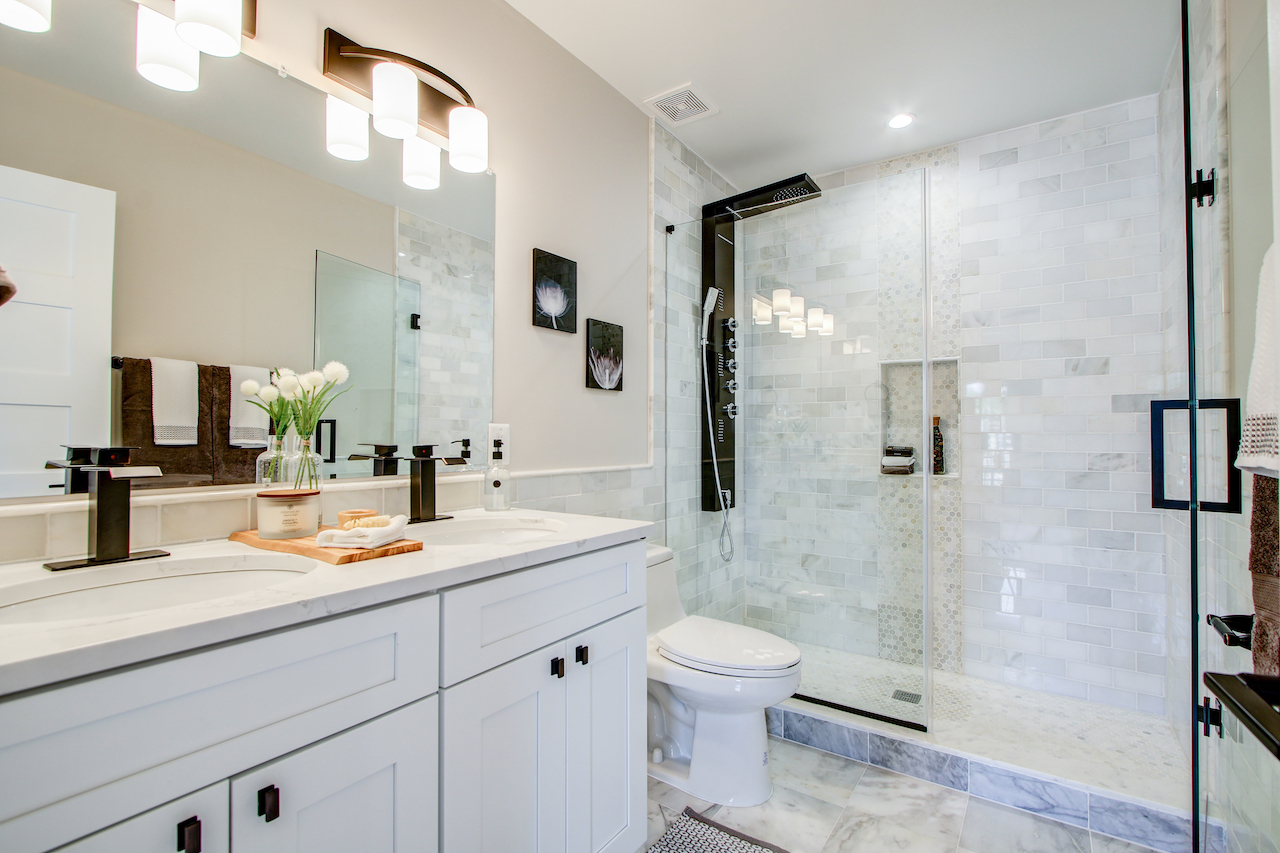This article provides valuable insights into the factors that affect how long a bathroom renovation project takes to complete in the UK.
It will help you understand what impacts the timeline so you can set realistic expectations.
How Long Does a Bathroom Renovation Take in the UK?
On average, a bathroom renovation in the UK takes 4-6 weeks to complete from start to finish.
This includes demolition, installing new fixtures, tiling, painting and allowing drying time.
The actual duration depends on the size and scope of the remodel.
Key Points
- Average bathroom renovation takes 4-6 weeks in the UK
- The timeline includes demolition, installing fixtures, tiling, painting and drying time
- Bigger renovations take longer than small bathrooms
Our Opinion
In our experience renovating bathrooms, the typical timeframe is 1-2 months.
Careful planning is crucial to keep the project on schedule and avoid delays.
We recommend allowing plenty of time for each stage – especially for drying and setting of materials like tile grout.
With good project management, most bathroom renovations can be completed within 4-6 weeks.
Factors Affecting Bathroom Renovation Timelines
Several key factors determine the duration of your bathroom remodel:
- Size of the bathroom – Smaller bathrooms with just a toilet and sink may only take 2-3 weeks, while larger suites with multiple fixtures need 4-6 weeks.
- Scope of work – Cosmetic changes like new tiles and fixtures are quicker than a full overhaul of the plumbing and layout.
- Custom designs – Unique finishes and custom-built cabinetry add time to account for planning and fabrication.
- Permitting – If you need council permits, allow several weeks for the application and approval process.
- Contractor availability – Their existing workload impacts when they can start and dedicate crews to your project.
- Delays – Unforeseen issues like water damage or faulty plumbing can extend timelines.
On average, a full bathroom renovation takes 4-6 weeks from start to finish. Carefully evaluating your plans with a contractor helps set realistic scheduling expectations before beginning.
Timeline For Small Bathroom Renovations
For a small bathroom remodel involving a simple update of fixtures and surfaces, the timeline is typically 2-3 weeks.
Here is a realistic breakdown:
- Planning & permits – 1 week
- Demolition – 2-3 days
- Installing new plumbing & electrical – 3-5 days
- Tiling, painting & installing fixtures – 1 week
- Finishing touches – 3-4 days
Careful prep work and ordering materials/fixtures ahead of time help keep projects on schedule. While every small bathroom renovation is unique, allocate 2-3 weeks for an efficient update.
Timeline For Medium Bathroom Renovations
For medium-sized bathroom renovations involving layout changes and installing new tiling, cabinets, and fixtures, the timeline is typically 4-5 weeks.
Here’s a realistic schedule:
- Planning, permits & demolition – 1-2 weeks
- Rough work – 1 week (framing, electrical, plumbing, ventilation)
- Installing fixtures & cabinets – 1 week
- Tiling & painting – 1 week
- Finishing touches – 1 week (caulking, grouting, sealing)
The demolition and rough work stages tend to take longer for medium renovations as you are likely adjusting wiring and plumbing. Allow extra time for unforeseen delays too. Careful planning and ordering long lead time items early allows projects to stay on track. For medium bathroom renovations, budget 4-5 weeks from start to finish.
Timeline For Large Bathroom Renovations
For extensive bathroom renovations involving knocking down walls, relocating plumbing, and a complete redesign, you should budget 6-8 weeks.
Here is a typical timeline:
- Planning, permits & demolition – 2 weeks
- Structural work – 1-2 weeks (removing walls, adding supports)
- Rough work – 2 weeks (plumbing, electrical, HVAC)
- Installing fixtures & cabinets – 1 week
- Tiling, painting & trims – 2 weeks
- Finishing touches – 1 week (caulking, sealing)
Large bathroom renovations involve more structural changes like moving walls, which extends timelines. Allow 2-3 extra weeks for potential delays. Careful coordination of tradespeople and ordering items with long lead times early allows the project to stay on schedule. For extensive bathroom renovations, plan on 6-8 weeks total.
How to Shorten Your Bathroom Renovation Timeline
Looking to speed up your bathroom renovation? Here are some tips to shorten the timeline:
- Get all required permits and approvals upfront. This prevents delays later.
- Order fixtures, tiles, vanities etc. as soon as the design is finalized. Check lead times.
- Hire contractors experienced with bathroom remodels who can work efficiently.
- Overlap tasks like tiling when possible while waiting for inspections.
- Use prefabricated shower enclosures to avoid lengthy tile work.
- Consider smaller format tiles which can be installed faster.
- Opt for paint rather than wallpaper which requires priming and drying time.
- Schedule tradespeople consecutively to avoid gaps between tasks.
Careful planning and coordination are key to finishing bathroom renovations faster. Order materials early, overlap tasks where possible, and keep tradespeople scheduled tightly. With some strategic decisions, you may be able to shave 1-2 weeks off the timeline.
FAQ
How long does it take to completely redo a bathroom?
On average, a bathroom renovation in the UK takes 4-6 weeks to complete from start to finish.
Can you renovate a bathroom in 2 weeks?
For a small bathroom remodel involving a simple update of fixtures and surfaces, the timeline is typically 2-3 weeks.
How long does it take to redo a small bathroom?
For a small bathroom remodel involving a simple update of fixtures and surfaces, the timeline is typically 2-3 weeks.
Conclusion
In summary, the time it takes to renovate a bathroom can vary greatly depending on the size and scope of the project. However, most bathroom renovations in the UK take around 4-6 weeks from start to finish. Key factors that affect the timeline include demolition, installing new fixtures/fittings, tiling, painting and allowing time for materials to dry. Planning properly and having a clear schedule are important to keep the project on track.


